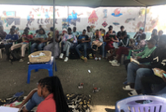Do you have a big dream?
Some gothic cathedrals in Europe took over 600 years -- more than 20 generations -- to complete! Although the Great Pyramid of Giza seems to have been built much faster (in a single generation), it also took tens of thousands of people.
In Tanzania, the Great Mosque of Kilwa was built in the 11th-14th centuries, rebuilt after earthquake damage, and continued to be remodeled up to the 18th century. It was described in the 1300s by Ibn Battuta. (You can take a 3D virtual tour of Kilwa! Check out the link in sources.)
The wonders of the world, modern and ancient, began as big dreams, dreams that took many generations to fulfill. Each generation continued the work of the past and also contributed to revising the blueprints for the future.
So if you are trying to do something great -- something that will really change the world -- don't expect to do it in one day. And don't try to do it alone.
Related proverbs:
Swahili:
Ukitaka kwenda haraka, nenda peke yako, ukitaka kwenda mbali, nenda na wenzako
If you want to go fast, go alone, if you want to go far, go together
French:
Rome ne fu[t] pas faite toute en un jour
from Li Proverbe au Vilain, published around 1190
Modern French: Rome ne s'est pas faite en un jour
Rome wasn't built in a day
Chinese:
冰凍三尺,非一日之寒
Three feet of ice is not the result of one cold day
Scottish Gaelic
Chan ann leis a’ chiad bhuille a thuiteas a’ chraobh
It is not with the first strike that the tree will fall

























